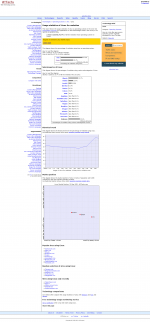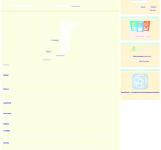You are using an out of date browser. It may not display this or other websites correctly.
You should upgrade or use an alternative browser.
You should upgrade or use an alternative browser.
Which is the best OS to install DirectAdmin on?
- Thread starter Sharif
- Start date
ai8
Verified User
- Joined
- Mar 14, 2021
- Messages
- 31
For private/single user mode: probly ubuntu.
For shared hosting/multi user mode: AlmaLinux with better future than CentOS, both upgradeable to CloudLinux with a few commands.
For shared hosting/multi user mode: AlmaLinux with better future than CentOS, both upgradeable to CloudLinux with a few commands.
Richard G
Verified User
Why? I don't see any reason why ubuntu would be better for private then for example Debian or better supported Centos/Alma. So I'm curious for any argumentation on that.For private/single user mode: probly ubuntu.
If you want to use Cloudlinux, indeed Centos 7 or AlmaLinux.
If you don't, you might want to choose Debian, because you can upgrade major versions without having to reinstall the server.
If that doesn't matter, maybe also Almalinux.
ai8
Verified User
- Joined
- Mar 14, 2021
- Messages
- 31
Purely from a stats POV: ubuntu is more widespread and hence it might be easier for most to put DA onto it.
AFAIK ubuntu major versions can be upgraded from cli easily as well.
But I agree that Debian is very good (and ubuntu is based on Debian), comes lean and is deemed more stable and thoroughly tested.
AFAIK ubuntu major versions can be upgraded from cli easily as well.
But I agree that Debian is very good (and ubuntu is based on Debian), comes lean and is deemed more stable and thoroughly tested.
Can you, without breaking DirectAdmin? (I know you can do it, I've done it before on my desktop, but I usualy break thingsIf you don't, you might want to choose Debian, because you can upgrade major versions without having to reinstall the server.
Richard G
Verified User
I had a hunch that was your thought, that's why I asked.Purely from a stats POV: ubuntu is more widespread and hence it might be easier for most to put DA onto it.
But purely from a stats view Ubuntu is the most widespread on desktop. But certainly not on servers, so no that does not make it better or easier, because on servers you don't use a Gui.
Debian is very stable and as you said, Ubuntu is based on Debian. So in console, it has the same commands and if you like stats, then Debian is more widely spread on DA servers. And you won't see a difference in Debian or Unbuntu when using the DA panel.
@k1l0b1t Yes you can. I heard it before and @bdacus01 confirmed it to me in another post too. However, if I would have to do it, I really would need to have good procedure because I tend to break things too in such situation.
However, it might be just something like upgrading and then do a ./build all d again to fix things, not sure, maybe @bdacus01 can enlighten us on that.
ai8
Verified User
- Joined
- Mar 14, 2021
- Messages
- 31
ubuntu server is more than twice as widespread as Debian server, see hereI had a hunch that was your thought, that's why I asked.
But purely from a stats view Ubuntu is the most widespread on desktop. But certainly not on servers, so no that does not make it better or easier, because on servers you don't use a Gui.
Debian is very stable and as you said, Ubuntu is based on Debian. So in console, it has the same commands and if you like stats, then Debian is more widely spread on DA servers. And you won't see a difference in Debian or Unbuntu when using the DA panel.
@k1l0b1t Yes you can. I heard it before and @bdacus01 confirmed it to me in another post too. However, if I would have to do it, I really would need to have good procedure because I tend to break things too in such situation.
However, it might be just something like upgrading and then do a ./build all d again to fix things, not sure, maybe @bdacus01 can enlighten us on that.
Usage Statistics and Market Share of Linux for Websites, July 2025
How many websites are using Linux
w3techs.com
DistroWatch.com: Put the fun back into computing. Use Linux, BSD.
News and feature lists of Linux and BSD distributions.
Of course you don't use a GUI on servers, that's why I wrote "lean" before.
The difference from having ubuntu as the underlying OS for DA will come from e.g. lower running cost (less often LTS upgrades, better and more modern drivers, latest web stack parts, etc).
And as more and more people use ubuntu in desktop, mobile, and server context, more of those (e.g. also employees) want (further) ubuntu servers too (as they are already familiar with it), so the trend will just grow stronger.
Plus, while FOSS is good, having a company behind your OS is reassuring, just like with FOSS panels versus paid ones.
Last but not least, one can "switch" better between panels without bothering to "learn a new OS" (again less cost/time involved) (e.g. plesk, DA, cpanel, etc).
Perhaps as a bonus, to see by example how widespread ubuntu in general it is, this old-but-gold infographic here
infographic: How many people use Ubuntu? | Ubuntu
Discover the range of industries, people and services that are using Ubuntu right now. Netflix. Snapchat. Dropbox. Uber. Tesla…and the International space station – what do they all have in common? They run on Ubuntu. To celebrate our upcoming 16.04 LTS we wanted to shine a bit of light on how...
Attachments
-
 Screenshot_2021-05-25 Usage Statistics and Market Share of Linux for Websites, May 2021.png213.8 KB · Views: 189
Screenshot_2021-05-25 Usage Statistics and Market Share of Linux for Websites, May 2021.png213.8 KB · Views: 189 -
 Screenshot_2021-05-25 DistroWatch com Put the fun back into computing Use Linux, BSD.png780.1 KB · Views: 167
Screenshot_2021-05-25 DistroWatch com Put the fun back into computing Use Linux, BSD.png780.1 KB · Views: 167 -
 Infographic_Ubuntu-Everywhere_(Alexia)_02.16_AW-01.png540.1 KB · Views: 161
Infographic_Ubuntu-Everywhere_(Alexia)_02.16_AW-01.png540.1 KB · Views: 161
Last edited:
Richard G
Verified User
That statistic seems a bit odd to me as it says Unix is twice as much more used then Linux on servers for websites????ubuntu server is more than twice as widespread as Debian server, see here
And Centos is less then Debian, while I don't know any host using Unix.
And cPanel as second of the biggest panels, doesn't even support anything else then Centos or alike.
So from the pro panels (used by hosters) only DA and Plesk support Ubuntu. So Plesk must be pulling almost all that Ubuntu weight.
Since that statement about unix being use almost twice as much, I have a hard time trusting these statistics.
As for that second link.... seems you can't really use that in a good way... try the same and instead of using "all" select "no desktop" and see what it says then.
Same if you try the same with the selection boxes below, as soon as you select "no desktop, all the known distro's are gone.
If you select "gnome" as desktop, it's Ubuntu first and Centos second. But in this case, that's also no good selection to make because no desktop's are used.
Lower costs? I don't know how. Except for upgrading to major OS versions and that's only if you're not using Debian.lower running cost (less often LTS upgrades, better and more modern drivers, latest web stack parts, etc).
As far as the driver upgrades, it would be comparible with Fedora which also has faster updates then Centos for example. But faster updates could also mean a little bit less stability. Not necessarily, but possible. Next to that, Debian can do the same, so why would it be better than Debian?
Since you like stats, have a look at this one:

The 10 Best Linux Distro for Stability in 2024 | AIM
Linux is the most popular open-source and programmer-friendly operating system with several advantages over other OS in terms of security, flexibility,
I rather look at what other hosting company's use and which panels they use and which OS they use.
Most widely used is not a definition of being better, but mostly a definition of being more popular. It's not a definite proof that it's better.
Windows is most widely used on desktops way more than any other OS, does it make that better than Linux? I don't think so.
So being widely spread is not really an argument, because there also are loads of developpers and hobbyists running vps systems with Ubuntu as "server" which is counted too.
However, having that said, I don't have any doubt that Ubuntu is most populair nowadays and I certainly won't say that it would be a bad choice. On the contrary. It's a very good choice.
But on servers you would mostly like compatibility and stability. And for stability I pointed to Debian.
But ofcourse if people would like Ubuntu more, it's also a good choice. I won't go into a discussion about that.
So yes I might have made a mistake by stating that Ubuntu is not the most widely spread on servers (but I ment hosting servers, and I still doubt that most hosting servers are running Ubuntu, I could be wrong), but I still stay with my recommendation as made before. But ofcourse next to Debian, one can also choose Ubuntu. But that seems logic to me as one also can choose Fedora instead of Centos. Kind of the same situation.
The one you like. The one you already understand. The one DA supports. There really is no such thing as best. What’s best for me might not be best for you. It’s also so easy to switch OS if you want. You really only have Redhat flavor or Debian flavor.Which is the best OS to install DirectAdmin on?
Richard G
Verified User
Yes there is. The best is depending on what you want to do later on, for example use Cloudlinux.There really is no such thing as best.
If that is not in the planning it doesn't matter much what you use, there are indeed 2 kind of flavor's left.